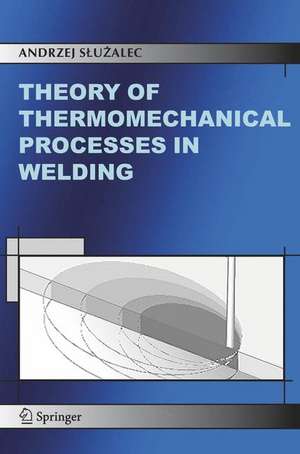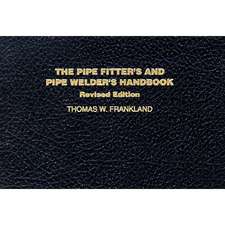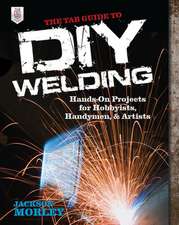Theory of Thermomechanical Processes in Welding
Autor Andrzej Sluzalecen Limba Engleză Hardback – 11 mar 2005
| Toate formatele și edițiile | Preț | Express |
|---|---|---|
| Paperback (1) | 629.56 lei 6-8 săpt. | |
| SPRINGER NETHERLANDS – 19 oct 2010 | 629.56 lei 6-8 săpt. | |
| Hardback (1) | 641.20 lei 6-8 săpt. | |
| SPRINGER NETHERLANDS – 11 mar 2005 | 641.20 lei 6-8 săpt. |
Preț: 641.20 lei
Preț vechi: 754.36 lei
-15% Nou
Puncte Express: 962
Preț estimativ în valută:
122.71€ • 127.64$ • 101.30£
122.71€ • 127.64$ • 101.30£
Carte tipărită la comandă
Livrare economică 12-26 aprilie
Preluare comenzi: 021 569.72.76
Specificații
ISBN-13: 9781402029905
ISBN-10: 140202990X
Pagini: 188
Ilustrații: X, 174 p. 85 illus.
Dimensiuni: 160 x 240 x 16 mm
Greutate: 0.44 kg
Ediția:2005
Editura: SPRINGER NETHERLANDS
Colecția Springer
Locul publicării:Dordrecht, Netherlands
ISBN-10: 140202990X
Pagini: 188
Ilustrații: X, 174 p. 85 illus.
Dimensiuni: 160 x 240 x 16 mm
Greutate: 0.44 kg
Ediția:2005
Editura: SPRINGER NETHERLANDS
Colecția Springer
Locul publicării:Dordrecht, Netherlands
Public țintă
ResearchCuprins
Fundamentals of Welding Thermomechanics.- Description of Welding Deformations.- Stress Tensor.- Thermodynamical Background of Welding Processes.- Motion of Fluids.- Thermomechanical Behaviour.- Numerical Analysis of Welding Problems.- Numerical Methods in Thermomechanics.- Heat Flow in Welding.- Analytical Solutions of Thermal Problems in Welding.- Numerical Solutions of Thermal Problems in Welding.- Welding Stresses and Deformations.- Thermal Stresses in Welding.- Welding Deformations.
Textul de pe ultima copertă
This book presents a modern viewpoint of welding thermomechanics and provides a unified and systematic continuum approach for engineers and applied physicists working on the modelling of welding processes. The theory presented includes developments in the areas of welding thermodynamics, thermoplasticity and numerical methods. The book describes the calculation of thermal stresses in welding structures, the theory of heat conduction in welding, and the basic equations of thermoplasticity, then applies the concepts to solutions of thermoplasticity problems and to thermal stresses in arc welding, laser welding, spot welding, electroslag welding and friction welding.
Caracteristici
This book covers the theory of all aspects of modern welding; arc, spot, laser, electroslag and friction. It is addressed to engineers and applied physicists working on models of deformable welding materials







